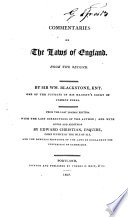 | William Blackstone - 1807 - 698 pages
...their maxim being, " the father to the bough, " the son to the plough '." 3. In most places he had a power of devising lands by will, before the statute...made - . 4. The lands descend, not to the eldest, youngest, or any one son only, but to all the sons together 1 ; which was indeed anciently the most... | |
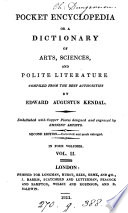 | Edward Augustus Kendall - 1811 - 474 pages
...the bougb, " The son to the plough ;" or, " The father to the bonde, ''. The son to the londe;" 8. In most places, he had the power of devising lands...the Kentish men made a stand against the conqueror. Gavelkind is, by some, said to signify the sort of tenure which belonged to gavel-land ; and gavel... | |
 | John Mason Good - 1813 - 714 pages
...father to the bough, the son to the plough." 3. In most places he had a power •of devising land« by -will, before the statute for that purpose was made. 4. The lands descend, not to the eldest, youngest, or any one son only, GAU but to all the sons together; which was indeed anciently the most... | |
 | Thomas Walter Williams - 1816 - 1048 pages
...being " the " father to the bough, the sou tu ihr plough." (Lamb. 634.) 3. ID most places be bad « power of devising lands by will, before the statute for that purpose was made (FNB 198. Сто. Car. 561.). 4. The lands descend not to the eldest, youngest, or any one sou only,... | |
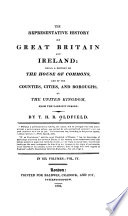 | Thomas Hinton Burley Oldfield - 1816 - 660 pages
...lands in gavelkind, holden of a common person, when the tenant is executed for felony. The tenant had a power of devising lands by will, before the statute for that purpose was made, in the 32d year of King Henry VIII. Lands in gavel-kind descend to all the sons alike in equal portions... | |
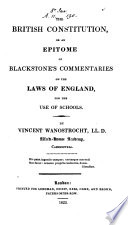 | Sir William BLACKSTONE, Vincent WANOSTROCHT - 1823 - 872 pages
...; their maxim being, " the father to the bough, the son to the plough." 3. In most places he had a power of devising lands by will, before the statute...was made. 4. The lands descend, not to the eldest, youngest, or any one son only, but to all the sons together; which was indeed anciently the most usual... | |
 | sir William Blackstone - 1825 - 626 pages
...their maxim being " the father to the bough, the son to the plough '." (5) 3. In most places he had a power of devising lands by will, before the statute for that purpose was made k. 4. The lands descend, not to the eldest, youngest, or any one son only, but to all the sons together'... | |
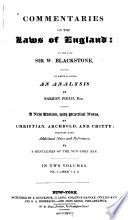 | William Blackstone - 1827 - 916 pages
...their maxim being " the father to the bough, the son to " the plough." (t) " 3. In most places he had a power of devising lands by will, before the statute for that purpose was made. Cfc) 4. The lands descend, not to the eldest, youngest, or any one s6\i only, but to all the sons together... | |
 | Thomas Curtis - 1829 - 814 pages
...felony; their maxim being, 'the father to the bough, the son to the plough.' 3. In most places he had a power of devising lands by will, before the statute...was made. 4. The lands descend, not to the eldest, youngest, or any one son only, but to all the sons together ; which was indeed anciently the most usual... | |
 | Parliament lists - 1832 - 1026 pages
...in gavel-kind, holden of a common person, when the tenant is executed for felony. The tenant had a power of devising lands by will, before the statute for that purpose was made, in the 32d year of King Henry VIII. Lauds in gavel-kind descend to all the sons alike in equal portions;... | |
| |